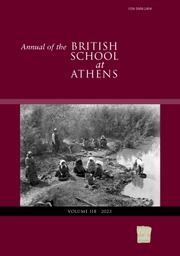No CrossRef data available.
Article contents
Damis of Nineveh and Walter of Oxford: a Literary Parallel
Published online by Cambridge University Press: 20 December 2013
Extract
When reading through Professor Phillimore's admirable preface to his translation of the Apollonios of Tyana of Philostratos, the discussion of the authenticity of the memoirs of Damis suggested to me a parallel in which literary history appears to have repeated herself. Although it possesses no intrinsic importance the coincidence is perhaps sufficiently a curiosity of literature to be worth recording. Philostratos' statement about the alleged memoirs is as follows (1,3):—
‘There was one Damis, a man not without accomplishments, who at one time inhabited Old Nineveh. His studies drew him into intimacy with Apollonius, and he has left a written account of the Sage's travels (in which he claims to have shared), his maxims, his discourses, and his prophetic sayings. A person who was related to this Damis brought the originals of these memoirs, hitherto undiscovered, to the knowledge of the Empress Julia. And since I had a place in her majesty's circle (she was a great admirer and patroness of all literary studies), she laid on me the task of transcribing and editing these papers. It was her wish also that I should be responsible for the form of expression; for the Ninevite's language, though clear, was anything but a model of literary art.’
- Type
- Research Article
- Information
- Copyright
- Copyright © The Council, British School at Athens 1912
References
page 234 note 1 I quote Thompson's translation edited by J. A. Giles, Bohn, 1842.
page 235 note 1 Phillimore, , Philostratus: In Honour of Apollonius of Tyana, p. xxiGoogle Scholar.
page 236 note 1 Miss Weston for example speaks of “Geoffrey of Monmouth drawing upon a work probably compiled by a continental Breton.” King Arthur and his Knights, p. 7.
page 236 note 2 Lewis Jones, W., King Arthur in History and Legend, p. 69Google Scholar.
page 236 note 3 Jones, op. cit. p. 63.
page 237 note 1 Nutt, , The Influence of Celtic on Mediaeval Romance, p. 15Google Scholar.
page 238 note 1 It is perhaps worth remembering that the invention of an authentic document was a commonplace of the romance writers. No one supposes, for example, that the history of the Trojan war written in Phoenician characters by the contemporary Diktys was really found in that hero's grave during the reign of Nero, or believes in the two autobiographical cyprus-wood tablets which were said to have been recovered from the grave of Deinias in the days of Alexander the Great. Further examples of the alleged discovery of historico-romantic documents in graves are given in Pfister, , Der Reliquienkult im Altertum, ii. pp. 503–505Google Scholar.




